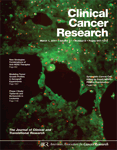Engrailed-2 (EN2) may be a new biomarker for the early detection of Prostate Cancer
One of the challenges with cancer is being able to detect the disease early enough for effective treatment. The staging or progression of the cancer at time of diagnosis is correlated with 5 year overall survival (OS) rates. Biomarkers that may be expressed by a cancer are, therefore, potentially useful for diagnosis and monitoring of treatment.
There is an ongoing debate about the effectiveness of prostate specific antigen (PSA) as a biomarker for early detection of Prostate Cancer (PC). As Sally Church on Pharma Strategy Blog discusses, PSA measurements can offer false positives and up to 75% of men have a negative biopsy. There is clearly a need for alternatives to PSA measurements.
 In the March 1, 2011 online edition of Clinical Cancer Research (a journal of the American Association for Cancer Research, AACR), Richard Morgan and colleagues from the Postgraduate Medical School at the University of Surrey in Guildford, assessed the potential of the Engrailed-2 (EN2) protein as a prognostic biomarker for PC.
In the March 1, 2011 online edition of Clinical Cancer Research (a journal of the American Association for Cancer Research, AACR), Richard Morgan and colleagues from the Postgraduate Medical School at the University of Surrey in Guildford, assessed the potential of the Engrailed-2 (EN2) protein as a prognostic biomarker for PC.
Their research found that EN2 is secreted into the urine of men with PC (92%, n=104), but does not appear in the urine of those without PC (0%, n=11). Presence of EN2 in the urine showed a 66% sensitivity for the detection of PC without a digital rectal exam (DRE) when compared to biopsy findings of those with confirmed PC (54 of 82 men). The specificity of the test is almost 90%, i.e. it can pick out men with prostate cancer versus those without cancer.
Interestingly, there was no correlation between serum PSA levels and the presence or absence of EN2. EN2 is measured in small quantities of unprocessed urine (100μl) by means of a simple enzymatic assay.
The investigators state in their paper that a multicenter clinical trial is planned to investigate whether EN2 measurements can be used as a tool for monitoring disease progression after hormonal treatment, radiotherapy or surgery.
However, despite the promising preliminary results in this paper, it is still too early to say whether EN2 will evolve into a clinically useful predictive biomarker for PC. The fact that EN2 was secreted in patients with non-PSA secreting PC, raises the possibility that it might have a diagnostic role to play in combination with other biomarkers.
EN2 has also been shown to be an oncogene in breast cancer, so it will be interesting to see if there is any further information presented at the forthcoming AACR annual meeting from April 2 to 6 in Orlando.
I recommend reading Pharma Strategy Blog for further insight on cancer biomarkers.